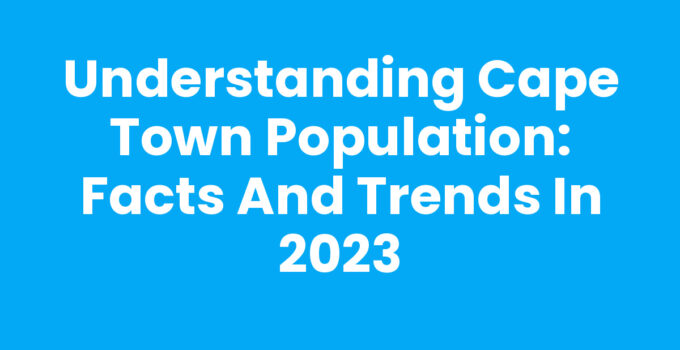Cape Town, the oldest city in South Africa, is famous for its breathtaking landscapes, rich culture, and diverse populace. The city is constantly evolving, and understanding its population dynamics provides valuable insights into its future. In this blog post, we will explore the Cape Town population, examining key statistics, demographic trends, cultural influences, and the implications of these changes.
Cape Town Population: Current Statistics and Trends
As of the latest census, Cape Town has a population of approximately 4.6 million people, making it one of the largest cities in South Africa. The city has witnessed significant growth over the past few decades, shaped by various factors including urbanization, economic opportunities, and migration.
The population of Cape Town is notably diverse. The demographic breakdown reveals various ethnic groups, languages, and cultures, with a sizable number of residents identifying as Black African, Coloured, Indian/Asian, and White. The most widely spoken languages include Afrikaans, Xhosa, and English, reflecting the city’s rich heritage.
Population growth has mainly been driven by a combination of natural growth and migration. Many people from rural areas relocate to Cape Town in search of better job prospects and living conditions, which contributes to the city’s vibrant and dynamic community.
Interestingly, the city’s urban landscape is varied, characterized by affluent suburbs and townships, each reflecting the socio-economic conditions of its residents. Understanding population distribution helps in urban planning, infrastructure development, and resource allocation, which are crucial for managing growth effectively.
Further Reading: VFS Contact Number Cape Town: Your Essential Guide
Factors Influencing Cape Town Population Growth
The growth of the Cape Town population can be attributed to several key factors:
- Migration: One of the most substantial contributors to Cape Town’s population growth is rural-urban migration. Many individuals migrate in search of better educational and employment opportunities.
- Natural Increase: The birth rate in Cape Town contributes significantly to population growth. Despite fluctuating trends, the city has maintained a relatively stable birth rate.
- Economic Opportunities: Cape Town’s robust economy, which encompasses tourism, technology, and manufacturing, attracts people seeking employment.
- Education and Healthcare: The availability of quality education and healthcare facilities in Cape Town keeps families settled for longer periods.
These factors intertwine, creating a unique demographic tapestry that makes Cape Town a distinctive and appealing city.
You Might Also Like: Explore the Elegance of Protea Hotel North Wharf Cape Town
Challenges and Considerations Regarding Cape Town’s Population
While Cape Town’s population growth is indicative of its economic vitality, it also presents various challenges that the city must address:
- Housing Shortage: Rapid population growth has led to increased demand for housing, resulting in a shortage that particularly affects lower-income residents.
- Infrastructural Strain: The influx of people puts pressure on transportation, healthcare, and education services, necessitating strategic urban planning and investment.
- Environmental Concerns: The growth contributes to environmental challenges, including pollution and resource depletion, which require sustainable management practices.
Addressing these challenges involves collaborative efforts between government entities, private sectors, and civic organizations. Sustainable urban planning and community engagement are essential for accommodating the growth while maintaining the city’s appeal.
As Cape Town continues to evolve, monitoring the population dynamics will be crucial for ensuring that the city remains livable for all residents.
In conclusion, the Cape Town population encompasses diverse backgrounds and cultures, contributing to its charm and complexity. As it grows, understanding the factors at play and addressing the associated challenges will be vital for maintaining the city’s vitality and enhancing the quality of life for all its inhabitants.
Recommended Guide: Exploring Cape Town Centre: Your Ultimate Travel Guide
Frequently Asked Questions
What is the current population of Cape Town?
As of the latest census, Cape Town has a population of approximately 4.6 million people.
What are the major factors contributing to Cape Town's population growth?
The major factors include migration, natural increase due to birth rates, economic opportunities, and access to education and healthcare.
What challenges does Cape Town face due to its growing population?
Challenges include housing shortages, infrastructural strain, and environmental concerns that require sustainable management.



